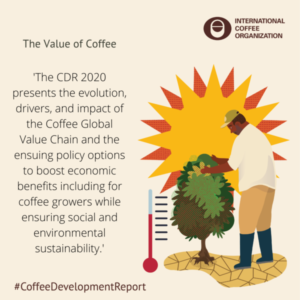Coffee Development Report 2020 on the Coffee GVC is now Online Accessible

The Coffee Development Report 2020 (CDR 2020) “The Value of Coffee: Sustainability, Inclusiveness, and Resilience of the Coffee Global Value Chain (GVC)” was released on Jan. 28, 2021 by the International Coffee Organization (ICO). The CDR 2020 gathers up-to-date research insights into the evolution of the international coffee trade, the key drivers of the development of the coffee GVC, and its economic, social and environmental impacts. It also provides policy suggestions that aim at raising economic benefits – also for coffee-growing countries and coffee farmers, while fostering the social and environmental sustainability.
Dr. Dennis Görlich (Kiel Institute for the World Economy, IfW) and KCG Researchers, Prof. Aoife Hanley, Ph.D. (KCG, IfW & Kiel University), Dr. Wan-Hsin Liu (KCG & IfW) and Finn Ole Semrau (KCG & IfW) contributed to the CDR 2020 by preparing a background paper “Fostering the Development of the Coffee Global Value Chains” that investigated the key factors that determine how and how intensively countries can be integrated into the coffee GVC and thus to be able to reap the globalization benefits.
Their analysis shows that there are two main ongoing upgrading trends in the coffee GVC. First, there is functional upgrading. The coffee production and trade worldwide turned to focus more on coffee products requiring more processing work, namely roasted coffee and soluble coffee. Second, there is product upgrading. The increasing prices of the exported roasted coffee and green coffee (particularly from Arabica growers) signalled some improvement in product quality over time, with the price increase (quality improvement) being more substantial for the former than the latter. The analysis also suggests that countries in economically more advanced regions such as the European Union, Europe (non-EU) and North America benefitted more from these upgrading trends and from the increasing complexity of the coffee GVC through their dominant role in exporting roasted coffee that has a much higher product value.
The investigation of the drivers of countries’ integration into the coffee GVC shows that the predominantly low– and medium-income coffee-growing countries require some minimum level of capital and industrial capability before they can add value to their exports. In other words, exports of processed coffee, including roasted and soluble coffee, are impacted by capital endowments and access to a domestic (or otherwise) manufacturing base. The analysis also shows that tariffs are catastrophic for functional upgrading, seeking to capture higher value added.
Their analysis once again showed that business and development must be considered together and a “GVC mindset” helps to do this. Through specialisation and longer-term relationship, companies can become more efficient and product quality can be significantly improved. The few large multinational coffee enterprises that dominate the market have an immense social responsibility towards their green coffee suppliers. The international community has to make sure that increasing protectionism does not interrupt GVCs, but that trade is kept open so as this route to development for developing, particularly coffee growing, countries is not blocked.
More information can be obtained here:
- The International Coffee Organization (2021), Coffee Development Report 2020, The Value of Coffee: Sustainability, Inclusiveness, and Resilience of the Coffee Global Value Chain, ICO: UK.
- Görlich, D., Hanley, A., Liu, W.-H., and Semrau, F. (2020), Fostering the Development of the Coffee Global Value Chain, Kiel Working Paper 2170, Kiel Institute for the World Economy: Germany.
-
- Frankfurter Rundschau (2021), Kaffeekonzerne sind die Gewinner. Wirtschaftsinstitut kritisiert Struktur des Handels / Forderung nach fairen Löhnen, 30. Jan. 2021, printed version.
-
- Frankfurter Allgemeine Zeitung (2021), Konzerne in der Verantwortung, 08. Februar, 2021, Nr. 32, Seite 20, printed version
